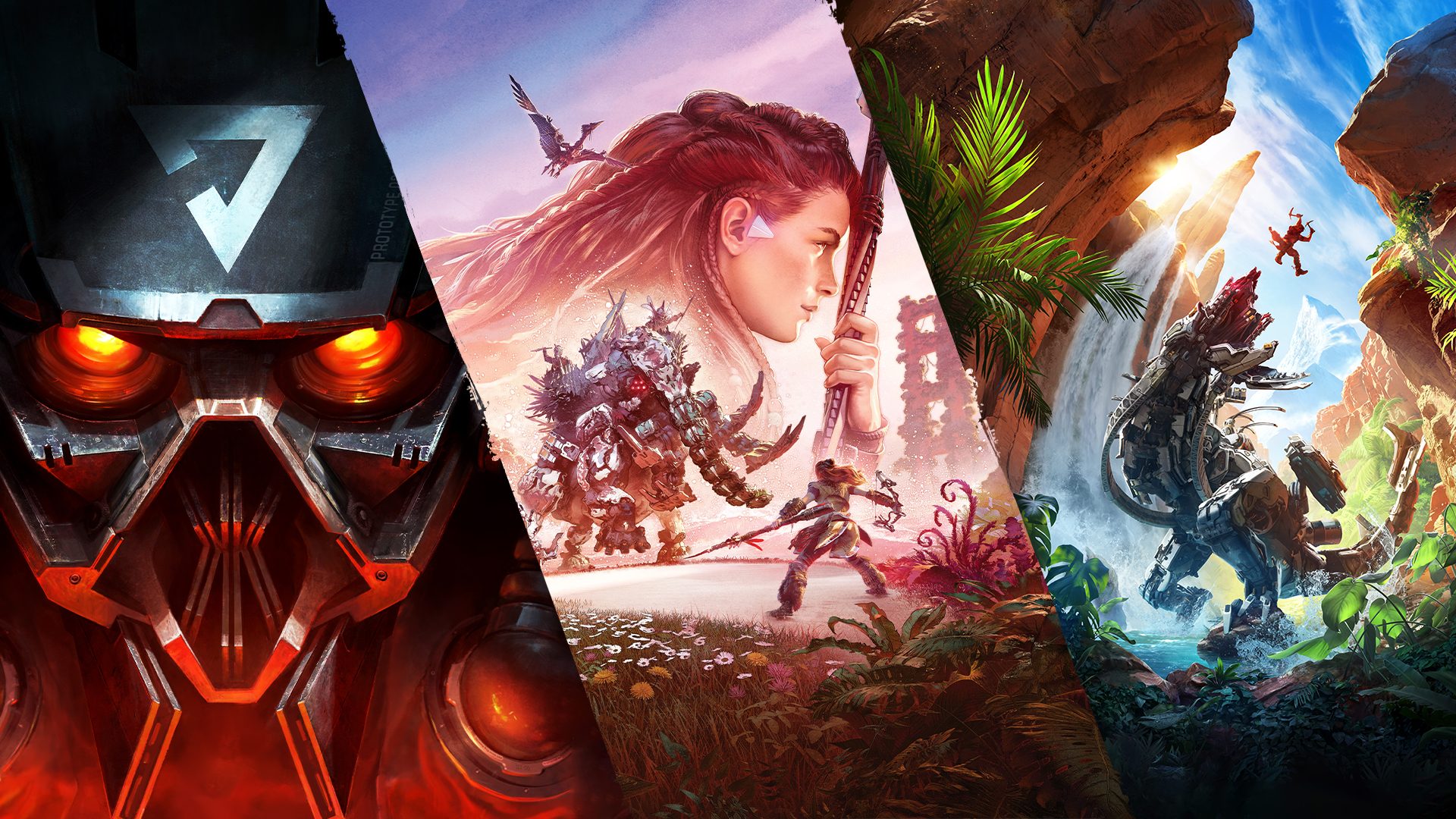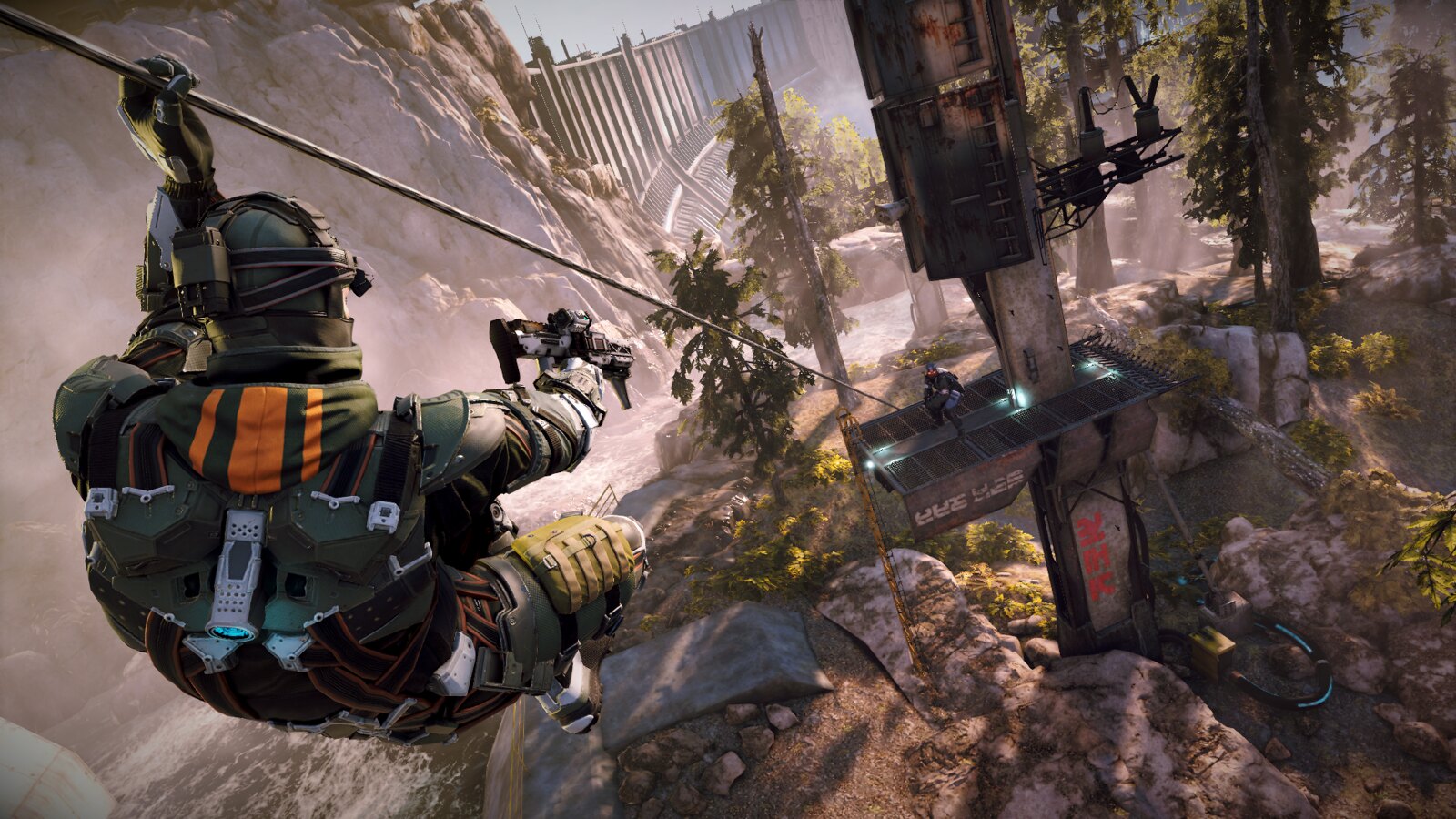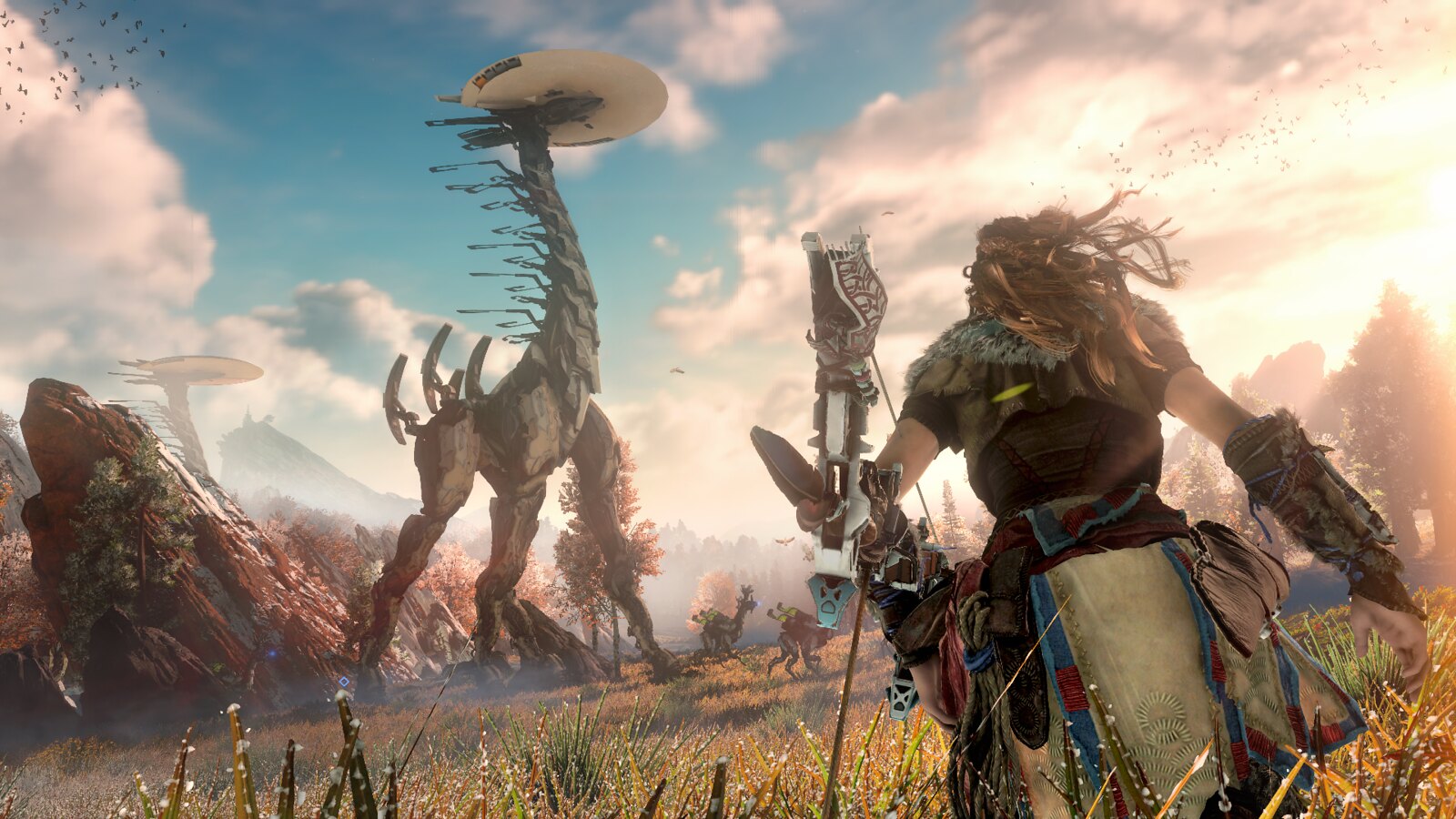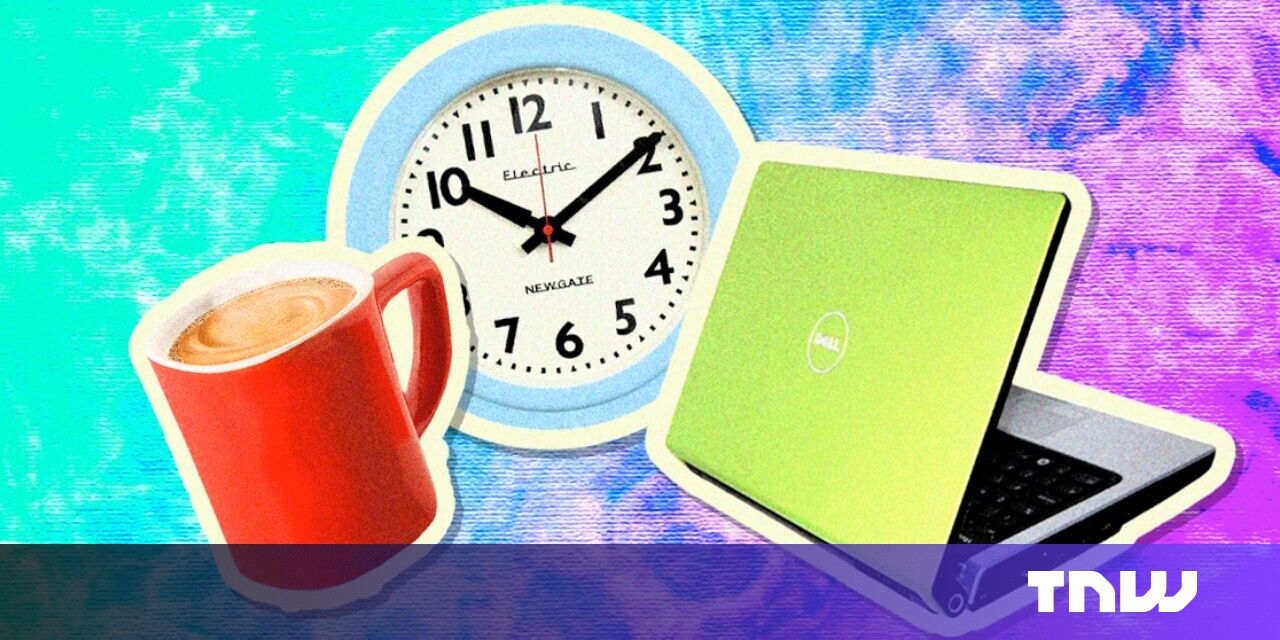
The year we formed Guerrilla, 2003, was an interesting time for gaming. The PlayStation 2 had launched three years earlier to critical acclaim. People were losing their minds over the technological feats being achieved with all the power it offered (six whole GFLOPS!).
Early days of development
Meanwhile, we were working hard in the Netherlands – some of us making Game Boy Color games. We were called Lost Boys, we were scrappy, maybe flying by the seat of our pants a little, but we were also ambitious. So, when the opportunity came up to create these new experiences that push boundaries and steer the industry, we grabbed it with both hands.
It was a time of experimentation, and it was exciting to be at the forefront of innovative, interactive technology. I think it’s clear that’s still in our DNA – in Decima, especially.
As Guerrilla, we made a lot of work for ourselves right off the bat, creating 3D immersive games with Shellshock: Nam ‘67 and Killzone. Unexpectedly, our small studio was quickly catapulted to the global stage. Killzone’s gritty galactic war captured the imagination of gamers, and we were proud of having made a mark in the industry and having developed a first-person shooter for Sony.

It wasn’t long until we jumped to work on the sequel. By this time, consoles were taking the world by storm, and PS2 players especially. By that point, we knew what we were doing a little bit more, and Killzone 2 raised the quality bar for us. It’s nice to see it considered a ‘classic’ of that generation – even if it makes me feel a little old reading that back.
Around when the PlayStation 3 console was launching, we became a first-party studio for Sony. They were really supportive of our creative visions, and their new technology was, as always, best-in-class. We experimented with the latest tech, like the PlayStation Move motion controllers, and we expanded the world of Killzone into handheld experiences.
This period was truly one of growth for us at Guerrilla in every sense. We navigated what it meant to be a first-party studio for Sony, growing and having visibility on the global stage. We were regularly producing games. They were popular. But it only pushed us into wanting to spread our creative wings, staying true to the motivation of our early years.

A new generation for Guerrilla
By the time we released Killzone Shadow Fall (2013) for the PS4, we were at a turning point. We had been developing Killzone successfully for almost ten years, and putting that aside was obviously a little scary. But we were feeling the itch to do something new, unlike anything we’d done before.
The whole story of how Horizon came to be is (flatteringly) covered in a Noclip documentary. Essentially, we opened the floor to the team. We asked the team what they wanted to make.
We knew it had to be incredible, stunning, and hopeful. Horizon itself really came from a visual idea of these primitive tribes, fighting to survive in a lush landscape dominated by great machines, long after the collapse of our current civilization. And we wanted an iconic franchise-worthy protagonist. The pitch had all of that. But the details of the story came later.
When production ended, even though we were proud of what we were creating with Horizon Zero Dawn, we all felt that sort of anxiety. Once you show it to the world, will people like it? Will they hate it?

The first sign that we might really have something was when Hermen Hulst (then managing director of Guerrilla, now head of PlayStation Studios) revealed the first trailer.
Let’s imagine this: E3 in 2015. Behind the scenes, we had been secretly working on Horizon Zero Dawn for several years – but now we were going to show it to the world. As we were waiting in line to get into the 5000-seat hall where PlayStation events were held, I turned to Hermen and said, “What if it doesn’t work? What if the whole idea of cave people fighting robot dinosaurs is just too silly?”
Hermen looked at me with a big grin and as he stepped into the event hall said, “Well, too late to worry about that!”
As the trailer played, we were glued to the live reaction – and totally floored by the passionate response.
Since Horizon Zero Dawn, our journey with Aloy has grown. With Forbidden West, we looked at every aspect of the first game and improved it. I think you can see that hard work in the excitement from fans since the launch. But during production, we were growing so much as a team and as a studio.
At one point, it was pretty clear we’d outgrown our beloved, almost-collapsing, canal-house office on the Herengracht; we had to have two diesel generators craned in because the building’s infrastructure just couldn’t support all our machines as well as air conditioning.
Growing into a positive future
Our studio’s grown from those early scrappy days to a massive group of hundreds of talented developers. And with us, the world of Horizon has also grown. Players have come face-to-face with our awe-inspiring machines in VR with Call of the Mountain. Comic books and board games are expanding the world. It’s truly humbling.
Of course, we can’t overlook the significant impact that our dedicated community has had on our games, studio, and people over the years. Guerrilla wouldn’t be where it is today without the support of our players.
As of April 16, 2023, the Horizon franchise has sold through more than 32.7 million units worldwide, of which Horizon Forbidden West has sold through over 8.4 million units. Millions more around the world have discovered Horizon thanks to PlayStation’s subscription services and initiatives, including PlayStation Plus, and Play at Home. All told, it’s a milestone we never imagined possible twenty years ago when we first started making games.

This reception has been staggering, and we’re grateful to the community for the continued love and support for the franchise. We Guerrillas feel lucky to witness that support every day: we share community fanart and the cosplay. I want you all to know we are completely blown away by your enthusiasm.
Last of all, I’d like to share that we are so excited that Aloy’s adventures will continue. Her latest mission takes her to the ruins of Los Angeles in Horizon Forbidden West: Burning Shores, and we can’t wait for you to find out where she’ll go next.
Thank you for being on this incredible journey with us for the past 20 years. Here’s to the next 20!
The year we formed Guerrilla, 2003, was an interesting time for gaming. The PlayStation 2 had launched three years earlier to critical acclaim. People were losing their minds over the technological feats being achieved with all the power it offered (six whole GFLOPS!).
Early days of development
Meanwhile, we were working hard in the Netherlands – some of us making Game Boy Color games. We were called Lost Boys, we were scrappy, maybe flying by the seat of our pants a little, but we were also ambitious. So, when the opportunity came up to create these new experiences that push boundaries and steer the industry, we grabbed it with both hands.
It was a time of experimentation, and it was exciting to be at the forefront of innovative, interactive technology. I think it’s clear that’s still in our DNA – in Decima, especially.
As Guerrilla, we made a lot of work for ourselves right off the bat, creating 3D immersive games with Shellshock: Nam ‘67 and Killzone. Unexpectedly, our small studio was quickly catapulted to the global stage. Killzone’s gritty galactic war captured the imagination of gamers, and we were proud of having made a mark in the industry and having developed a first-person shooter for Sony.

It wasn’t long until we jumped to work on the sequel. By this time, consoles were taking the world by storm, and PS2 players especially. By that point, we knew what we were doing a little bit more, and Killzone 2 raised the quality bar for us. It’s nice to see it considered a ‘classic’ of that generation – even if it makes me feel a little old reading that back.
Around when the PlayStation 3 console was launching, we became a first-party studio for Sony. They were really supportive of our creative visions, and their new technology was, as always, best-in-class. We experimented with the latest tech, like the PlayStation Move motion controllers, and we expanded the world of Killzone into handheld experiences.
This period was truly one of growth for us at Guerrilla in every sense. We navigated what it meant to be a first-party studio for Sony, growing and having visibility on the global stage. We were regularly producing games. They were popular. But it only pushed us into wanting to spread our creative wings, staying true to the motivation of our early years.

A new generation for Guerrilla
By the time we released Killzone Shadow Fall (2013) for the PS4, we were at a turning point. We had been developing Killzone successfully for almost ten years, and putting that aside was obviously a little scary. But we were feeling the itch to do something new, unlike anything we’d done before.
The whole story of how Horizon came to be is (flatteringly) covered in a Noclip documentary. Essentially, we opened the floor to the team. We asked the team what they wanted to make.
We knew it had to be incredible, stunning, and hopeful. Horizon itself really came from a visual idea of these primitive tribes, fighting to survive in a lush landscape dominated by great machines, long after the collapse of our current civilization. And we wanted an iconic franchise-worthy protagonist. The pitch had all of that. But the details of the story came later.
When production ended, even though we were proud of what we were creating with Horizon Zero Dawn, we all felt that sort of anxiety. Once you show it to the world, will people like it? Will they hate it?

The first sign that we might really have something was when Hermen Hulst (then managing director of Guerrilla, now head of PlayStation Studios) revealed the first trailer.
Let’s imagine this: E3 in 2015. Behind the scenes, we had been secretly working on Horizon Zero Dawn for several years – but now we were going to show it to the world. As we were waiting in line to get into the 5000-seat hall where PlayStation events were held, I turned to Hermen and said, “What if it doesn’t work? What if the whole idea of cave people fighting robot dinosaurs is just too silly?”
Hermen looked at me with a big grin and as he stepped into the event hall said, “Well, too late to worry about that!”
As the trailer played, we were glued to the live reaction – and totally floored by the passionate response.
Since Horizon Zero Dawn, our journey with Aloy has grown. With Forbidden West, we looked at every aspect of the first game and improved it. I think you can see that hard work in the excitement from fans since the launch. But during production, we were growing so much as a team and as a studio.
At one point, it was pretty clear we’d outgrown our beloved, almost-collapsing, canal-house office on the Herengracht; we had to have two diesel generators craned in because the building’s infrastructure just couldn’t support all our machines as well as air conditioning.
Growing into a positive future
Our studio’s grown from those early scrappy days to a massive group of hundreds of talented developers. And with us, the world of Horizon has also grown. Players have come face-to-face with our awe-inspiring machines in VR with Call of the Mountain. Comic books and board games are expanding the world. It’s truly humbling.
Of course, we can’t overlook the significant impact that our dedicated community has had on our games, studio, and people over the years. Guerrilla wouldn’t be where it is today without the support of our players.
As of April 16, 2023, the Horizon franchise has sold through more than 32.7 million units worldwide, of which Horizon Forbidden West has sold through over 8.4 million units. Millions more around the world have discovered Horizon thanks to PlayStation’s subscription services and initiatives, including PlayStation Plus, and Play at Home. All told, it’s a milestone we never imagined possible twenty years ago when we first started making games.

This reception has been staggering, and we’re grateful to the community for the continued love and support for the franchise. We Guerrillas feel lucky to witness that support every day: we share community fanart and the cosplay. I want you all to know we are completely blown away by your enthusiasm.
Last of all, I’d like to share that we are so excited that Aloy’s adventures will continue. Her latest mission takes her to the ruins of Los Angeles in Horizon Forbidden West: Burning Shores, and we can’t wait for you to find out where she’ll go next.
Thank you for being on this incredible journey with us for the past 20 years. Here’s to the next 20!








